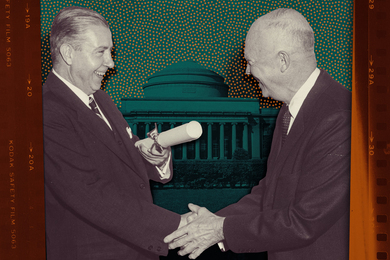The role, goals and membership of the Administrative Advisory Committee (AAC) have been broadened, Provost Robert A. Brown and Executive Vice President John R. Curry announced at a meeting of administrative and fiscal officers on Wednesday, Oct. 11.
The changes have been made to enhance communications and working relationships among central administrative offices and administrators in the departments, labs and centers (DLCs).
The new AAC also has a modified name. It will be the Administrative Advisory Council II (AACII), to recognize its reconstituted state. "It's an extension of the AAC, but it's also a new beginning," the provost said.
The Council will report jointly to the provost and the executive vice president and will be chaired by Marilyn Smith, administrative officer in the Department of Biology. According to its charter, AACII is charged with establishing a forum for thoughtful, sustained interaction among representatives of the central offices and administrators in the DLCs.
"AACII can help us to improve communication so it's really a two-way street," Mr. Curry said. "We look forward to solving more problems quickly and together."
Another important role of AACII is to identify administrative processes or systems that place undue stress and workload on administrators across the Institute, and to recommend steps for alleviating those situations. Professor Brown and Mr. Curry indicated that if there are budgetary implications to such recommendations, they will review proposals by the council to deploy new resources for the schools to use as part of the annual budget cycle.
The new group also will provide a formal mechanism by which central administrative areas that are contemplating changes can obtain meaningful and timely input from DLCs. Longer-term planning for redefining the role of administrative officers in the DLCs is another goal for AACII.
Members of the current AAC were invited to finish their terms, and several additional members were asked to join the group. Council members are expected to solicit input from their colleagues in order to play a representative role. The council will continue to maintain the aac-aoquery e-mail list, which reaches much of the administrative community. The e-mail address for contacting the AACII members is aacii@mit.edu.
In addition to Ms. Smith, AACII members are Bruce Brown, Division of Comparative Medicine; Rebecca Chamberlain, Department of Architecture; Elizabeth Cooper, Engineering Systems Division; Gill Emmons, Controller's Accounting Office; Virginia Esau, Department of Physics; Deborah Fairchild, Office of the Dean for Undergraduate Education/Dean for Student Life; Christine Foglia, Sloan School; Patricia Greer, Office of Sponsored Programs; Ron Hasseltine, Center for Materials Science and Engineering; Thomas Hrycaj, Plasma Science and Fusion Center; Maureen Maguire, Department of Economics; Mary Markel, Human Resources Department; Janet Sahlstrom, Financial Systems Services; and Margaret Warner, Office of Budget and Financial Planning.
Ex officio members are Patricia Brady, Executive Vice President's Office, and Doreen Morris, Provost's Office, who will provide frequent communication to Mr. Curry and Professor Brown.
A version of this article appeared in MIT Tech Talk on October 18, 2000.





